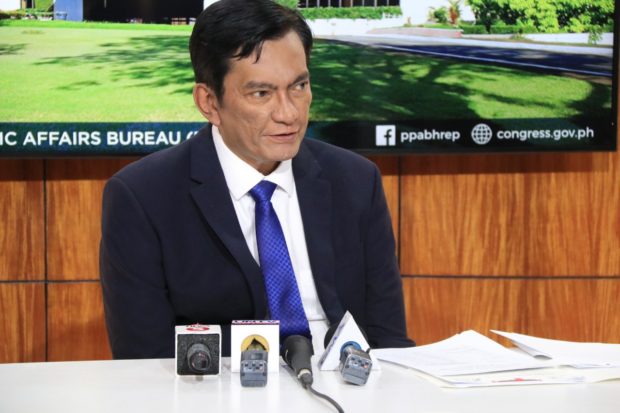
Albay Rep. Joey Salceda. File photo
MANILA, Philippines – Albay 2nd District Rep. Joey Salceda has asked the Inter-Agency Task Force on Emerging Infectious Diseases (IATF) to reconsider its decision to lift the enhanced community quarantine (ECQ) due to COVID-19.
Salceda explained that as Albay currently has the most cases of COVID-19 in Bicol Region, allowing people to move around may only lead to more problems in terms of local transmissions.
He said that 28 out of Bicol’s 50 cases are in Albay — 56 percent of the cases in the whole region when the province only represents 23 of Bicol’s population.
“The DOH [Department of Health] can verify this if they want to, but based on our estimates, Albay’s [reproduction rate] is approaching 2 again. In practical terms, that means we are back to our risk levels from mid-April. Of course, we want to return to normal, but there’s little evidence that we should, and we want to get this right,” Salceda said in a statement.
“Sad to say, we are the infection cluster in Bicol. So, if you want to prevent further transmissions in the region, you have to defeat the virus here,” he added.
Earlier, reports showed that the IATF has already granted the request of Albay officials for an extension of the ECQ, according to Legazpi City Mayor Noel Rosal. However, he admitted that the documents ordering the ECQ extension have not been signed and approved by President Rodrigo Duterte.
After the ECQ over Luzon expired, the IATF and Duterte moved to extend it over areas that have high rates of coronavirus infections and transmissions.
However, several areas that have registered COVID-19 cases but remain as low-risk areas were placed under a general community quarantine (GCQ), where restrictions are more relaxed compared to ECQ areas. Albay was placed under that category, but town officials including Rosal believe that it might be premature to do so.
Salceda, an economist by profession who also serves as the House of Representatives ways and means committee chair, said that the potential lifting of the ECQ over Albay does not only have a health impact, but an economic one as well.
The lawmaker noted that if Albay proceeds to be under a GCQ, people in the province would no longer be part of the national government’s social amelioration program (SAP) — which would place the livelihood of some in peril.
“The people won’t instantly have the means to support themselves, but with this drastic change, Albay will lose access to the [SAP] and we need to settle our bills and our loans,” Salceda noted.
“To think about economics and epidemiology along provincial boundaries, as if everything goes back to normal with one stroke of the pen, I think is not a very prudent policy to take,” he claimed.
Salceda’s views have been instrumental in the ECQ over Luzon, as he pushed for a Metro Manila-wide lockdown to mitigate the health and economic effects of the COVID-19 pandemic. He also previously mentioned that a lockdown is necessary since the Philippines has one of the lowest coronavirus testing rates in Asia.
The Department of Health said on Friday that there are now 8,772 patients infected with the coronavirus around the country, of which 579 have died and 1,084 have recovered.
Worldwide, over 3.25 million individuals have been infected, while at least 233,397 have died from the disease and over 1.01 million have recovered from it.